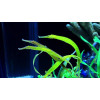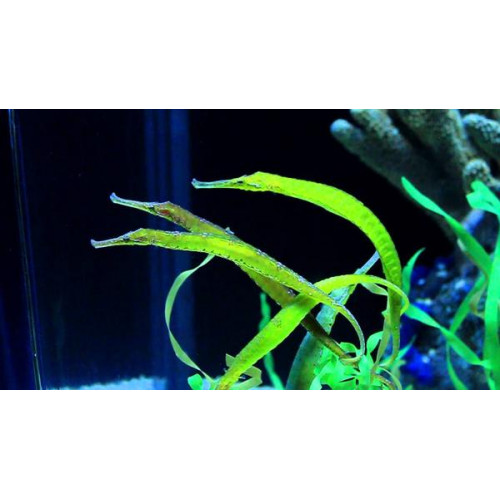Species Name : Syngnathoides Biaculeatus
Care Level : Difficult
Color : Green
Temperament : Peaceful
Diet : Carnivore
Max Size : 28 cm
Reef Compatible : Yes
Water Conditions : sg 1.020-1.025, 72-78° F, dKH 8-12, pH 8.1-8.4
Origin : West Indian Ocean
Family : Syngnathidae
Minimum Aquarium Size : 50
The Crocodile Pipefish (Syngnathoides Biaculeatus) or double-ended pipefish is a species of fish in the family Syngnathidae.
The Crocodile Pipefish are variable in colour from a green/yellow to brown or grey, depending on habitat.
Pipefish have slender, straight, bodies which are able to camouflage well with seagrasses and weeds. Their long, rigid bodies look like they have armor plating around them which protects them from predators. They move around slowly as they only have a tiny dorsal fin, mostly using gentle currents, and require frequent rest.
This social species is best kept in mating pairs or groups of its own kind in a 50 gallon or larger tank with plenty of live rock, plants and structures to grab onto.
You’ll also need to include plenty of caves and overhangs to provide shelter, with lots of colour to replicate the natural environment they are used to.
This social species is best kept in mated pairs or groups of its own kind in an aquarium. It may be kept with small, shy fish such as small gobies, seahorses, dragonets, and firefish. Aggressive, territorial, or fast-moving fish do not make good companions. Pipefish will be harmed by anemones and corals with stinging tentacles or corals that are large enough to consume them, such as brain corals. Pipefish can also be harmed by invertebrates such as crabs and large shrimp. Pipefish are not great at competing for food and for this reason they should be kept in a tank with only other pipefish or seahorses.
The Crocodile Pipefish normally prefers to eat only live mysis, brine shrimp or feeder shrimp in a mature reef aquarium with plenty of live rock or macroalgae. An ideal diet to start this fish on is Live Copepods, and vitamin-enriched live baby brine shrimp, however, live baby brine should not make up the majority of its diet. Over time, the Crocodile Pipefish may become accustomed to eating frozen mysis and brine shrimp.
-
There are no reviews for this product.
-
No questions yet


